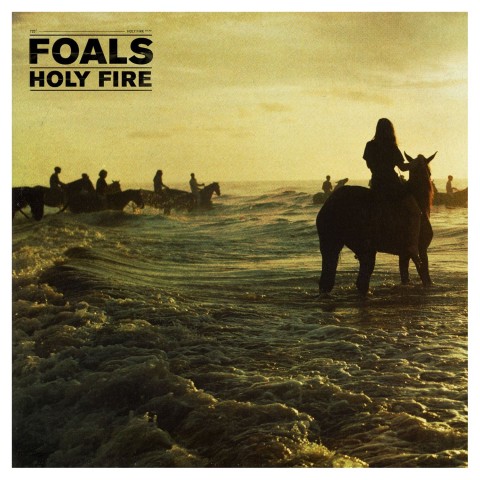"I made my mistakes, and I feel something’s changed / Wash the stains away, and I feel quite OK" – ‘Bad Habit’ What will the end of everything feel like? Will it be a split-second drop? A white-hot infinity? Or will it be a pale, slow release; a relief that, only at the instant we’re subsumed, do we recognise as something we’ve long been longing for?
‘Moon’, the final track on Foals’ Holy Fire, gives us a vision of the latter. Spare, diaphanous and almost dizzy with its own levity, it foresees a final unravelling not unlike that imagined by Lars von Trier in his 2011 film Melancholia: in a faint, lullabying delivery, frontman Yannis Philippakis observes the apocalypse not as some biblical inferno but as a series of friezes; a nearly reverent surrender in the face of something that’s actually kind of comforting in its indifference.
It’s this lightheadedness – a sort of woozy awe effected by pared instrumentation and producers Flood and Alan Moulder’s aerated, translucent atmospheres – that dominates the Oxford five-piece’s third album. And despite its muscular moments – the retaliatory, talons-out ‘Inhaler’, the argumentative ‘Prelude’ and the bristle of second single ‘My Number’ – Holy Fire is a pneumatic, vaporous-sounding record that deals mostly with the ache, ambience and eventual acceptance of being alone.
Three tracks in particular chart this motion from protest to acquiescence. Taking the blueprint of Total Life Forever‘s disquieting lead single ‘Spanish Sahara’ and endowing it with an almost subliminal power, centrepiece ‘Last Night’ is Holy Fire‘s most immediately stirring work. Written partly about Yannis’ grandmother but more generally about growth, decay, time and our inexorable slump forwards, its patient, sequential pulses build to a panorama that’s both precision-engineered for swollen festival sunsets and devastating in its undecorated desperation to believe you can hold on to someone ("stay with me, stay with me”).
Though humbler, cowed and head down – ticking in on choked guitars and cello – ‘Stepson’ still clings to the idea of solace in numbers ("I’ll lead you by the hand/and we’ll fall into the blue/oh I’m coming down for you”). But by the time ‘Moon’ has laid out its perversely calm vista of destruction – listen closely and you can hear the slap and paddle of water as "birds fall out of the sky in two by twos” – there’s a reassurance in the idea of giving up; of recognising that we are something and nothing in the face of the elemental. "I am you now, and you are me instead,” Yannis shrugs, only half sure it means anything; in his reverse, freeze-framed Noye’s Fludde, "the world is quiet, and there’s nothing left unsaid.”
Whether it comes with age, experience, or both, there’s a point at which we can detect our torment shifting to tolerance, our fast-calcifying angst beginning to make room for something approaching understanding. With Holy Fire, Philippakis and his band – Jack Bevan, Walter Gervers, Edwin Congreave and Jimmy Smith – have gone some way towards capturing the sound of that transition. From the glissandos and vertigo of ‘Milk & Black Spiders’ to the jounce and yawn of ‘Providence’, in every note and noteless space you can feel it: the physical unburdening, the personal reckoning, the fatigue and reprieve of letting go.


